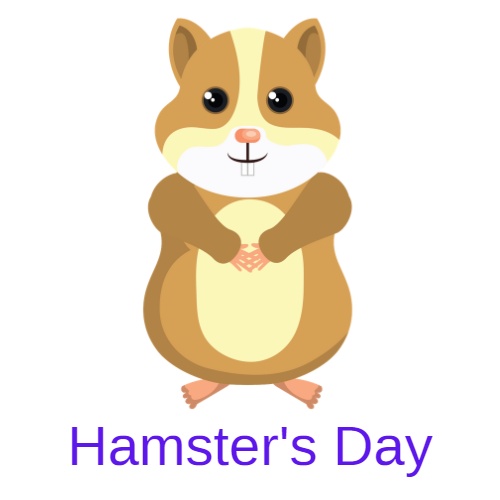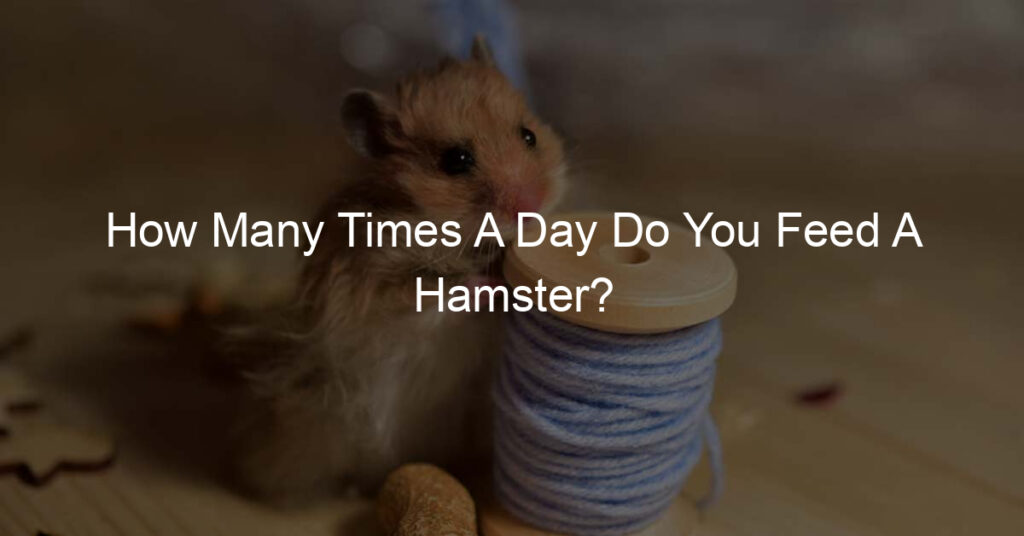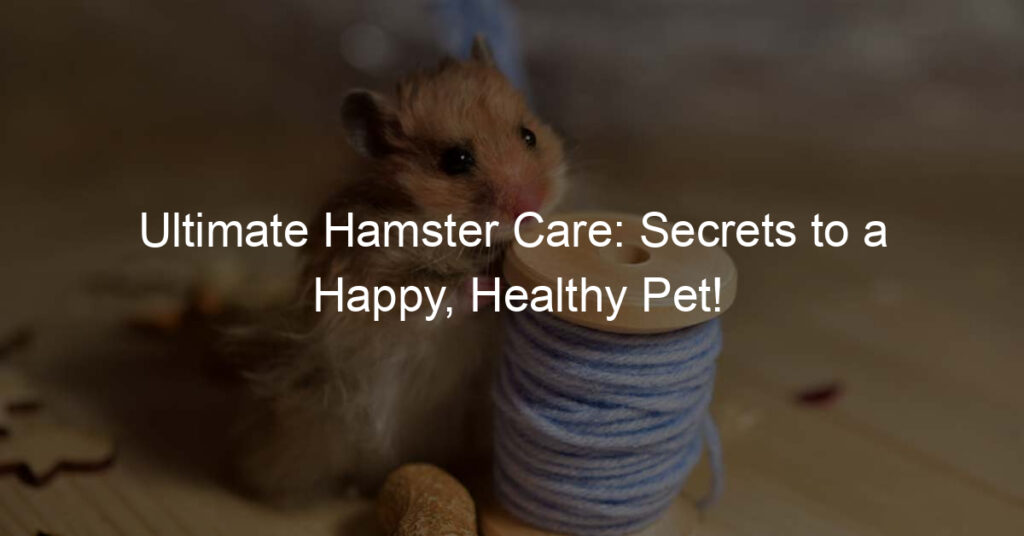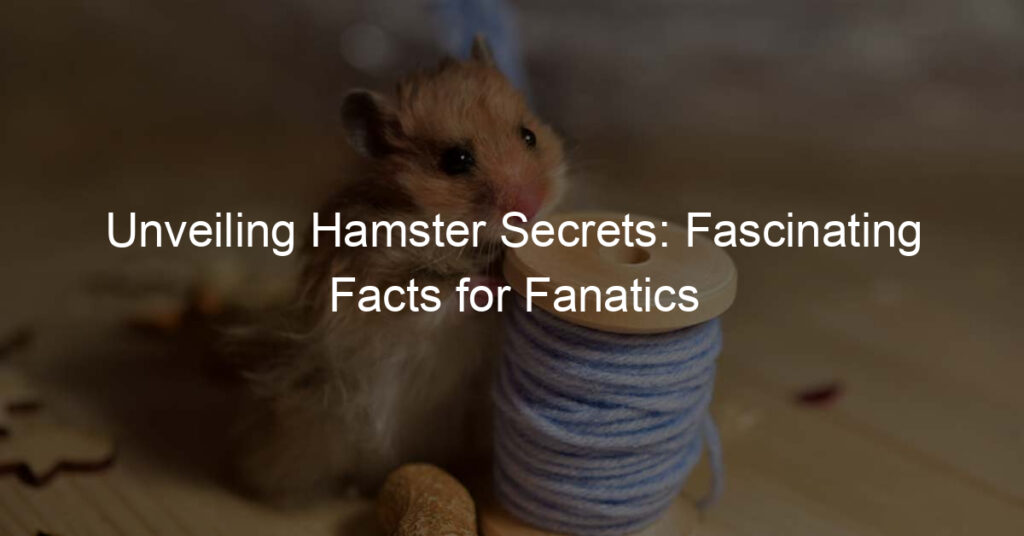Caring for a hamster means understanding and meeting its dietary needs. Hamsters are small creatures with specific nutritional requirements, and creating a proper feeding schedule is crucial for their health and well-being.
Knowing how many times a day do you feed A Hamster is an essential question for pet owners looking to maintain a healthy and happy environment for their furry friend.
Hamsters are nocturnal animals, meaning they are most active during the nighttime hours and typically require feeding later in the day.
The amount and frequency of feeding depend on factors such as their weight, age, and breed. Generally, hamsters eat about 1 to 2 tablespoons of food per day.
Smaller breeds, such as dwarf hamsters, may need only 1 tablespoon per day, while larger breeds may require more.
Understanding the ideal diet for your hamster is also vital. Providing a balanced mix of protein, carbohydrates, and fats supports their overall health and energy levels.
Tips for feeding hamsters include offering a consistent schedule, minimizing the risk of overfeeding, and recognizing potential dangers associated with improper meal plans.
Key Takeaways
- Adjust feeding frequency based on your hamster’s weight, age, and breed
- Aim to provide a balanced diet to maintain overall health and energy
- Establish a consistent feeding schedule and avoid overfeeding to prevent potential risks
How Many Times A Day Do You Feed A Hamster
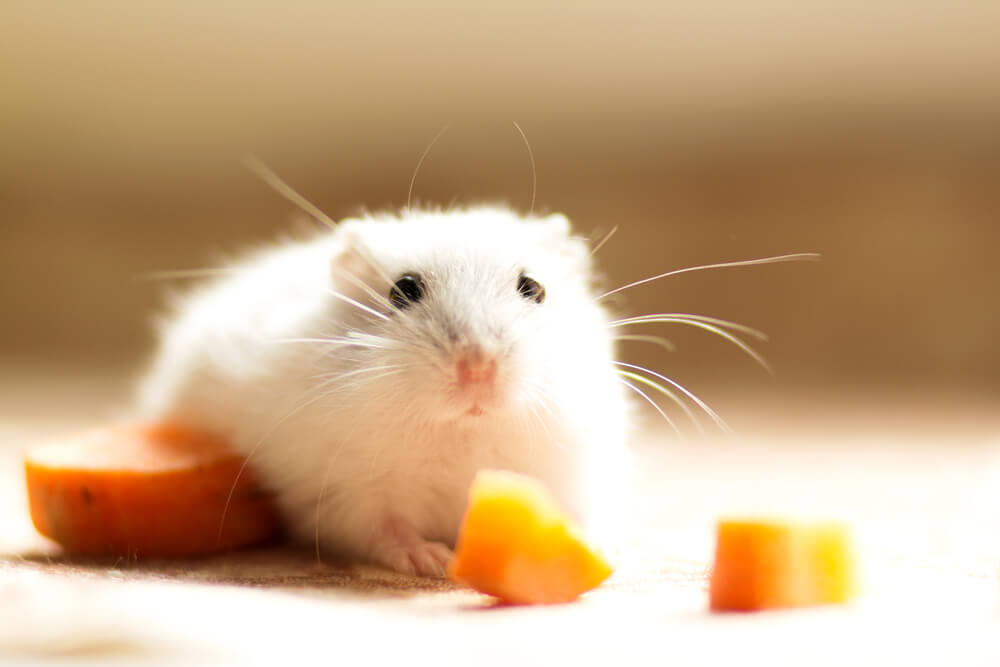
Hamsters are small and energetic creatures that require a balanced diet to maintain their health and well-being.
As a hamster owner, it’s essential to understand their dietary needs and establish a proper feeding schedule to ensure they remain healthy and happy.
The amount of food your hamster needs mainly depends on its weight and age. In general, a hamster will eat around 2 tablespoons of food mix per day.
For smaller hamsters, such as Dwarf varieties, they will only need around 1 tablespoon per day.
It’s important to monitor your hamster’s food consumption and adjust its portions based on its body conditions and health.
A typical hamster diet includes a mix of grains, seeds, vegetables, and fruits. It’s essential to offer a variety of food to maintain their nutritional balance and prevent them from becoming picky eaters.
However, there are some foods that can be harmful to hamsters, so be sure to avoid feeding them any citrus fruits, garlic, onions, chocolate, or salty foods.
When it comes to feeding frequency, it is recommended to feed your hamster during or shortly after sundown, as they are nocturnal animals.
Aim to provide their regular food portion once per day between 6:00 pm and 9:00 pm. Treats can be offered 1 to 2 times per week, depending on your hamster’s needs and current health.
Remember that a consistent feeding schedule is crucial for your hamster’s well-being.
Animals, including hamsters, thrive on predictability, and maintaining a stable routine can help prevent stress and ensure a healthier, happier pet.
Frequency of Hamster Feeding
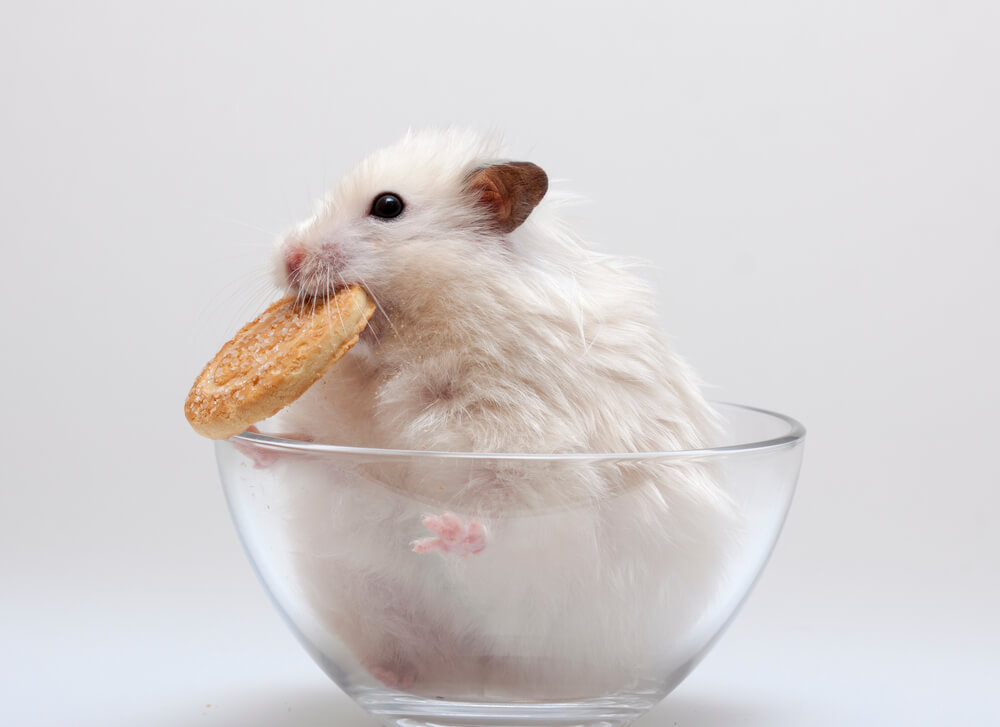
Infant Hamsters
For infant hamsters, it’s important to provide them with the right nutrition.
During the first 3-4 weeks of their life, they should be fed their mother’s milk exclusively. When they reach around four weeks old, they can start transitioning to solid food.
At this early stage, make sure to feed baby hamsters three to four times a day for proper growth and development.
Adult Hamsters
As your hamster grows into adulthood, their feeding schedule will change. Adult hamsters benefit from a consistent feeding routine.
Feed them once per day during or shortly after sundown, typically between 6:00 pm to 9:00 pm. This schedule aligns with their natural nocturnal habits.
When it comes to measuring food, the amount depends on the hamster’s weight and age. In general, an adult hamster will eat around 2 tablespoons of food mix per day.
However, smaller hamsters, such as Dwarf varieties, only require around 1 tablespoon per day.
Besides their core diet of dry food, you may also provide treats for your hamster. Treats can be given 1 to 2 times per week, depending on your hamster’s health, age, and body condition.
Make sure to choose healthy and safe treats that will not harm your pet.
Remember, consistency is key for your hamster’s well-being.
By following a proper feeding schedule and considering factors such as age and size, you will ensure that your hamster is receiving the right nourishment and staying healthy throughout its life.
Ideal Hamster Diet
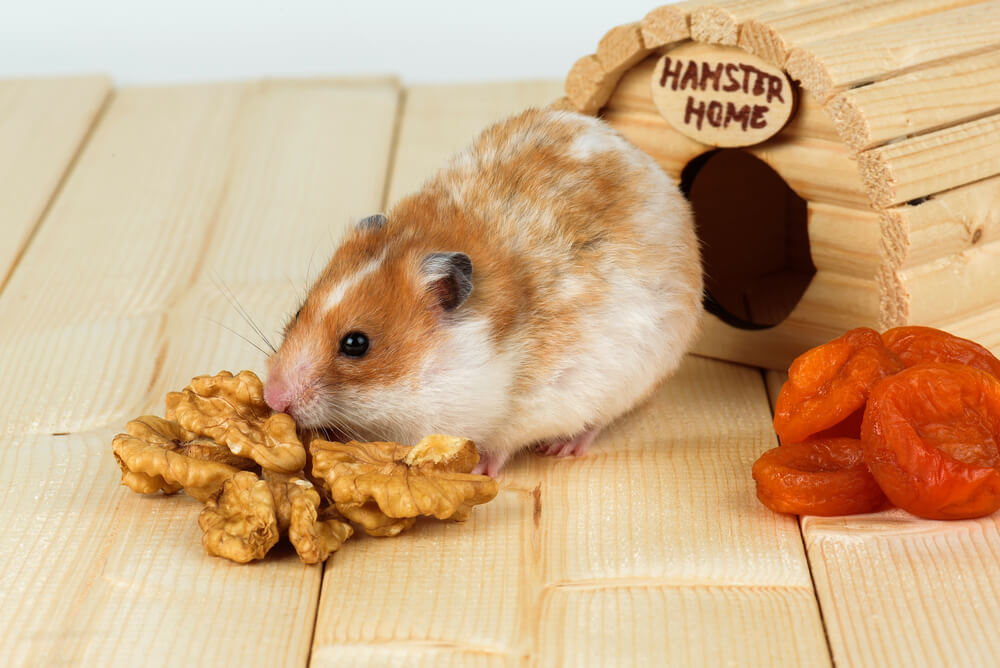
Ingredients for a Healthy Diet
A well-balanced hamster diet consists of high-quality pellets or food mix, fresh vegetables, and occasional treats.
On average, a hamster will consume around 2 tablespoons of food mix per day, with smaller hamsters like dwarf varieties needing only about 1 tablespoon per day.
For optimal health, feed your hamster once a day, ideally during or shortly after sundown.
When choosing a food mix or pellets, look for options containing a variety of ingredients, such as seeds, grains, and dried vegetables.
Additionally, be sure to supplement their diet with fresh vegetables like kale, spinach, and bell peppers.
Foods high in fiber are essential as they help maintain a healthy digestive system.
Keep fruit servings below 1 teaspoon per day, due to their sugar content.
Foods to Avoid
Unfortunately, not all foods are safe or healthy for your hamster. Some items can cause digestive problems or even pose life-threatening risks.
Avoid feeding your hamster the following:
- Onions and garlic: These can cause digestive upset and may be toxic.
- Almonds, apple seeds, and cherry pits: These contain cyanide, which is hazardous to hamsters.
- Chocolate, caffeine, and high-sugar foods: These can lead to obesity, dental issues, and heart problems.
In addition to avoiding these specific foods, be cautious of overfeeding, as this can lead to obesity and related health issues.
To prevent overfeeding, weigh the food you give your pets and provide treats only 1 to 2 times per week, depending on your hamster’s health and age.
Carefully monitoring your hamster’s diet, can help you ensure they live a happy, healthy life.
Tips for Feeding Hamsters
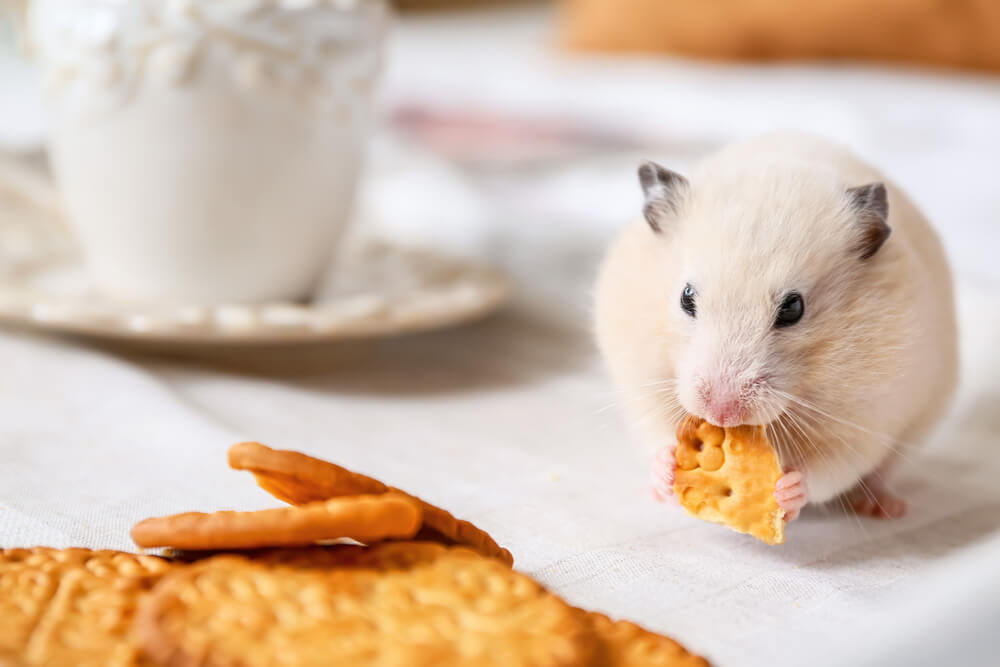
Creating a Feeding Schedule
To ensure the health and well-being of your hamster, it’s important to establish a consistent feeding schedule.
Hamsters generally need to be fed once per day, providing them with a steady source of nutrition.
This helps to regulate their metabolism and prevents them from binge-eating or developing obesity.
Portion Sizes
The ideal portion size for your hamster depends on its species and size.
For example, Syrian hamsters typically require two tablespoons of food once a day, while smaller species like Dwarf, Robo, or Chinese hamsters may only need one tablespoon per day.
Be sure to observe your hamster’s eating habits and adjust portion sizes accordingly to prevent overfeeding or wasting food.
- Syrian hamsters: 2 tablespoons of food per day
- Dwarf hamsters: around 1 tablespoon of food per day
- Robo or Chinese hamsters: 1 tablespoon of food per day
Feeding Environment
Creating a comfortable feeding environment for your hamster is essential for promoting healthy eating habits.
Place the food in a designated area within the cage, preferably in a shallow dish or a stable food dispenser to prevent spills and contamination.
Ensure that the cage is clean, well-maintained, and free from any potential hazards or distractions that may deter your hamster from eating.
To keep your hamster’s diet diverse and nutritionally balanced, provide a commercial hamster mix that consists of pellets or seed mixes, which have been formulated to meet their specific dietary needs.
In addition, you can supplement your hamster’s diet with small amounts of fresh fruits, vegetables, and safe treats to maintain variety and enjoyment in their eating experiences.
Remember, consistency is key when feeding your hamster.
Adhering to a regular schedule, offering appropriate portion sizes, and creating a pleasant feeding environment, can ensure you a healthy and happy hamster.
Potential Risks of Improper Feeding
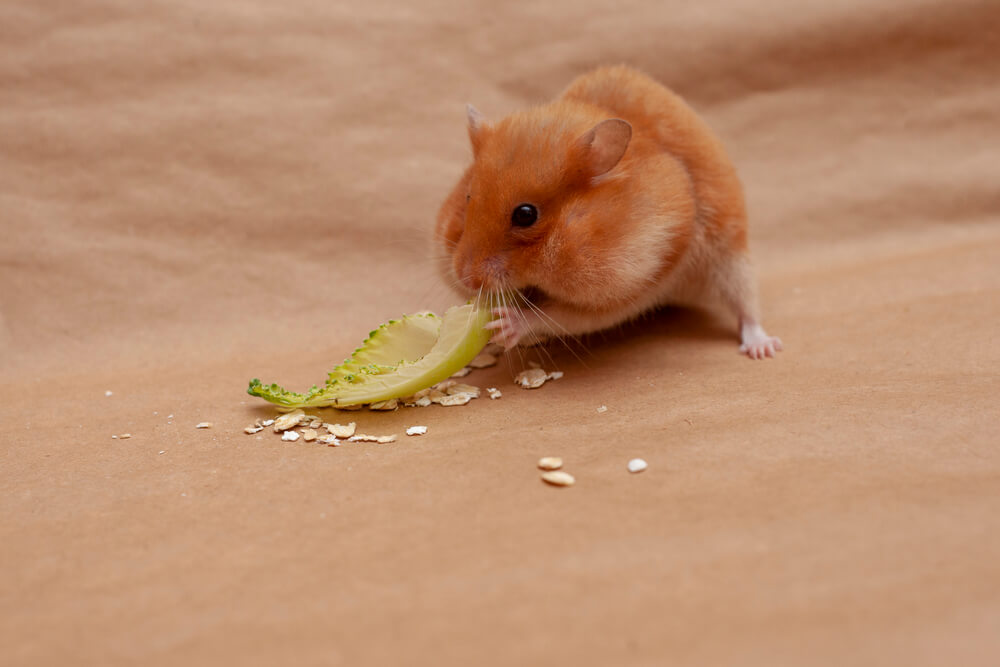
Feeding your hamster properly is essential for its overall health and well-being.
Yet, if you do not feed your hamster correctly, it could lead to potential risks, such as obesity and malnourishment.
In this section, we will explore these risks and how they can affect your pet hamster.
Obesity in Hamsters
Overfeeding or providing too many high-calorie treats to your hamster can lead to obesity.
This condition poses serious health risks to your pet, as it can lead to:
- Diabetes
- Heart problems
- Joint issues
- Reduced lifespan
To prevent obesity in your hamster, it’s crucial to maintain a balanced diet and avoid overfeeding.
Offer a variety of healthy, low-calorie treats and avoid giving too many high-calorie, sugary foods.
Keep in mind that hamsters are usually more active at night, so offering a small portion of their daily food intake during these hours can help in maintaining a healthy weight.
Malnourishment in Hamsters
On the other hand, if you don’t provide your hamster with enough food or the right nutrients, it may become malnourished.
Malnourishment in hamsters can result in:
- Weakness and lethargy
- Susceptibility to illnesses
- Hindered growth and development
- Vitamin and mineral deficiencies
To prevent malnourishment, make sure you are providing a well-balanced diet that consists of a quality hamster mix, fresh vegetables, and occasional treats.
Monitor your hamster’s food intake and adjust it accordingly to ensure they’re receiving the nutrition they need.
While some hamsters may require more food due to their age or activity level, it’s important not to overfeed, as this can lead to obesity.
In conclusion, being aware of the potential risks of improper feeding can help you ensure your hamster maintains optimal health.
Providing a balanced diet and keeping an eye on their food consumption should lead to a happy, healthy pet.
Conclusion
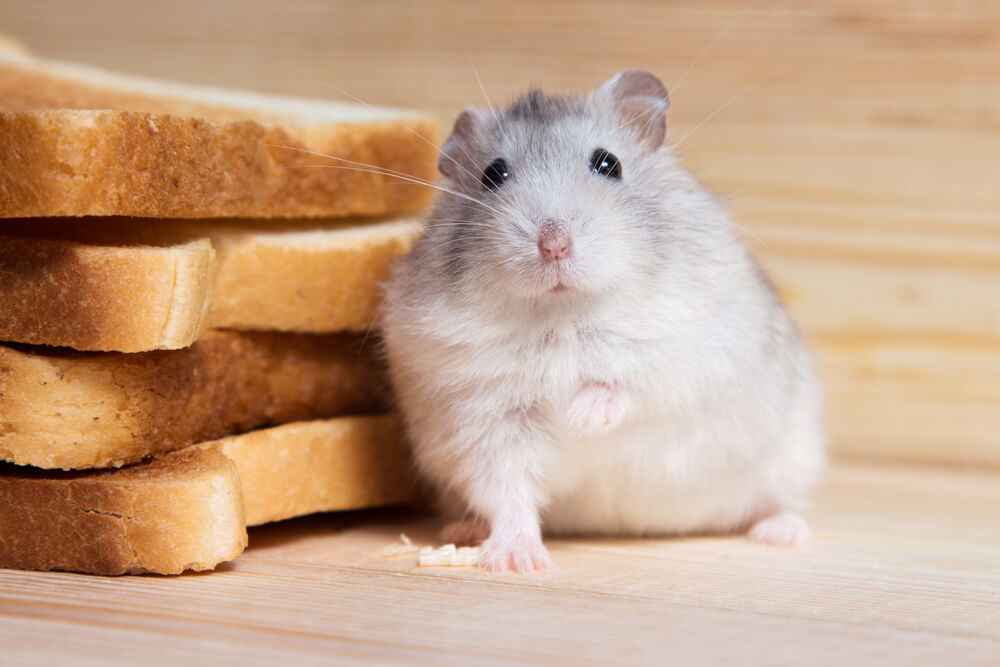
Feeding your hamster properly is essential to maintain their health and well-being.
A general guideline is to provide them with around 2 tablespoons of food mix per day; however, this amount may vary depending on the size and age of your hamster.
For instance, smaller hamsters such as Dwarf varieties may only need around 1 tablespoon per day.
It is best to feed your hamster during or shortly after sundown, as they are nocturnal animals and are more active during this time.
Treats can be given to your hamster 1 to 2 times per week, while taking into consideration their body conditions, health, age, and pregnancy status.
To ensure a balanced diet for your hamster, it is important to have a proper feeding schedule and know what types of food they require.
Also, remember to adjust the feeding frequency for baby hamsters, starting them with small amounts of solid food three to four times a day when they are around four weeks old, and then decreasing the frequency to twice a day as they grow.
By following this information, you’ll be creating a healthy and comfortable environment for your hamster, contributing to its overall happiness and longevity.
Always monitor your hamster’s food intake and consult with a veterinarian if you notice any unusual changes in their eating habits or health.
Frequently Asked Questions
How often do Syrian hamsters eat?
Syrian hamsters should be fed once per day, typically in the evening when they become more active.
Providing a daily serving of hamster food mix, consisting of around 2 tablespoons, will help maintain their health and well-being source.
What is the feeding schedule for dwarf hamsters?
Dwarf hamsters have a similar feeding schedule to Syrian hamsters. You should feed them once per day, usually in the evening.
Since dwarf hamsters are smaller than Syrians, it is recommended that you feed them slightly less food, around 1 to 1.5 tablespoons of hamster food mix daily.
Can hamsters be fed multiple times per day?
Though hamsters can be fed multiple times per day, it is not necessary. Feeding your hamster once per day is adequate for maintaining a balanced diet and their natural feeding habits source.
However, make sure their food and water are clean and always available.
What is the ideal portion size for feeding a hamster?
For adult hamsters, the ideal portion size is around 2 tablespoons of a hamster food mix per day source.
Adjust the portion according to your pet’s size, age, and activity level.
Baby hamsters need to be fed more frequently, but you should gradually shift them to an adult feeding schedule as they grow older.
How often should hamsters be fed vegetables?
Hamsters can benefit from the occasional fresh vegetable in their diet, offering them treats 1 to 2 times per week.
Try offering small amounts of vegetables like carrots, broccoli, or spinach to supplement their regular food mix.
Always remove uneaten vegetable treats from their cage, as they can spoil and affect your hamster’s health.
What is the best time of day to feed a hamster?
The best time of day to feed a hamster is during or shortly after sundown, between 6:00 pm and 9:00 pm source.
Hamsters are most active during this time, and it best aligns with their natural feeding habits.
Ensure that you maintain a consistent feeding schedule to promote their well-being and comfort.
